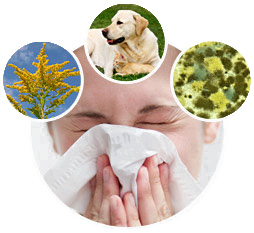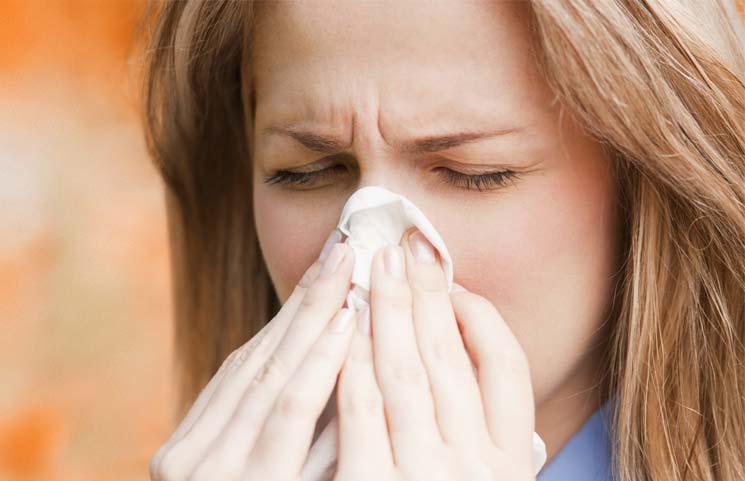How To Deal With Allergies
Whenever you are considering starting a new medical program, medicine, or treatment, always make sure to consult your physician and discuss things with them first.

Allergy Season Symptoms
If you happen to be coughing, sneezing, or having a difficult time breathing properly, there is a good chance that allergy season has finally begun. The definition of an allergic attack is actually very simple: it is when your body overreacts to a normal substance that is generally supposed to be harmless to the average human population. Allergic reactions can be caused my many substances, including pollen, mold, dust mites, or animal dander.
There are numerous side effects caused by allergies, and reactions such as sneezing, watery and itchy eyes, and runny noses are just a few.
Who Is Affected By Allergies?

A surprisingly large number of individuals suffer from allergies. In fact, over 20 percent of people in North America have them.
Quite a few individuals who have allergies or hay fever tend to mistake their symptoms for those that are caused by either colds or sinus infections. However, allergies and colds could not be more different. The main distinction between them is that symptoms caused by colds generally last for more than 10 days. Additionally, colds also often involve thick, green and yellow mucus, which is much more different than the clear and runny mucus that comes from allergies.
As we have mentioned before, the symptoms caused by allergies are generally an itchy or runny nose, sneezing, an itchy throat, an itchy palette, as well as oftentimes swollen and pale mucus membranes. It is important to note that the main characteristic that differentiates allergies between the common cold is the commonplace itchiness.
Misconceptions About Allergies
A popular misconception that many individuals tend to have is that allergies are actually the same as the body just being “too sensitive”. Because of this fact, I strongly recommend that you make an appointment with a professional physician in order to determine which substances you could potentially be allergic to. This will enable you to avoid certain foods, pollutants, plants, and other agents that may wind up irritating your system.
Additionally, you will be able to learn how to treat symptoms and reduce potential effects. In order to determine all of these things, your physician may choose to conduct either a RAST test, or potentially a skin scratch test. These two tests will tell your doctor whether you are allergic to certain items, simply sensitive to them, or both.
It is also important to keep in mind that there are many different cross overs between certain environmental allergies and allergies that are caused by the foods that we eat. Because of this, always make sure to ask your doctor if this fact will ever affect you or not.

Natural Allergy Relief
If you do happen to suffer from environmental allergies, don’t worry- there are many different natural remedies for you to consider using. To begin with, there are quite a few nutritional alterations that you can choose to make. Perhaps you should consider increasing your Omega-3 consumption, or eating more fruits and vegetables. The more fruits and vegetables that you eat, the healthier that you will then be; especially if they contain flavonoids.
Additionally, green drinks, such as Spirulina, have also been proven to decrease allergy symptoms. Scientists have shown that the compound Butterbur is also very effective in preventing allergic reactions in individuals who are particularly sensitive. In fact, Butterbur is equally as effective as any prescription allergy medication on the market.
If you take an herbal remedy that has Butterbur in it, 2-3 times a day for just two weeks, you are almost guaranteed to start noticing a difference. However, if you know that are sensitive to plants that are related to marigolds, ragweed, chrysanthemums, and daisies, you may want to avoid using Butterbur.
Homeopathic treatments are also incredibly effective in regards to preventing and treating allergies. Homeopathic treatments are simply treatments that involve oral solutions being placed underneath the tongue. These oral solutions generally contain small amounts of the allergen that the individual is allergic to, and the entire purpose is to build up the body’s immunity to it.
How To Prevent Allergies
Changing certain aspects of one’s lifestyle is a great way to prevent extreme allergic reactions. Ensuring that you properly irrigate your nasal cavities and flush out your sinuses will help you to not only treat your allergies, but to also prevent them from occurring in the first place. Also, make sure that you properly bathe each and everyday. You will want to make sure that you get all of the allergens out of your hair, as well as those that are stuck to your body. Plus, if you wash your clothes in hot water rather than cold water, you will be able to successfully destroy almost all of the allergens.
You also may want to consider purchasing a HEPA filter in order to have in your home. A HEPA air purifier will help to clean circulating air, while simultaneously dehumidifying it. This will help to clean out dust mites, dust molecules, mold, and fungus.
Whenever you are considering starting a new medical program, medicine, or treatment, always make sure to consult your physician and discuss things with them first.









